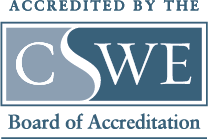School of Social Work
Mission Statement
The mission of Northeastern State University’s (NSU) School of Social Work is to academically prepare competent and effective professionals, particularly first-generation college students, who are committed to generalist social work practice. Our curriculum is designed to integrate and apply the knowledge, skills, and values outlined in the Council on Social Work Education (CSWE) competencies and behavioral indicators, along with the National Association of Social Workers (NASW) Code of Ethics.
These foundations prepare our graduates to practice social work in a wide range of agencies and allied settings with diverse client systems. Our program places a strong emphasis on serving Native American communities and offers the option to specialize in child welfare leadership. Additionally, our MSW program has a clinical practice focus, preparing students to become mental health professionals equipped to provide high-quality clinical services.
The NSU School of Social Work offers a Bachelor of Social Work, a Master of Social Work, and an online MSW program, including an Advanced Standing option.
Student Learning Outcomes
Competency 1: Demonstrate Ethical and Professional Behavior
- a. Make ethical decisions by applying the standards of the National Association of Social Workers Code of Ethics, relevant laws and regulations, models for ethical decision making, ethical conduct of research, and additional codes of ethics within the profession as appropriate to the context;
- b. Demonstrate professional demeanor in behavior; appearance; and oral, written, and electronic communication.
- c. Use technology ethically and appropriately to facilitate practice outcomes.
- d. Use supervision and consultation to guide professional judgment and behavior.
Competency 2: Advance Human Rights and Social, Racial, Economic, and Environmental Justice
- a. Advocate for human rights at the individual, family, group, organizational, and community system levels; and
- b. Engage in practices that advance human rights to promote social, racial, economic,
and
environmental justice.
Competency 3: Engage Anti-Racism, Diversity, Equity, and Inclusion (ADEI) in Practice
- a. Demonstrate anti-racist and anti-oppressive social work practice at the individual, family, group, organizational, community, research, and policy levels; and
- b. Demonstrate cultural humility by applying critical reflection, self-awareness, and self-regulation to manage the influence of bias, power, privilege, and values in working with clients and constituencies, acknowledging them as experts of their own lived experiences.
Competency 4: Engage in Practice-informed Research and Research-informed Practice
- a. Apply research findings to inform and improve practice, policy, and programs; and
- b. Identify ethical, culturally informed, anti-racist, and anti-oppressive strategies
that address
inherent biases for use in quantitative and qualitative research methods to advance the
purposes of social work.
Competency 5: Engage in Policy Practice
- a. Use social justice, anti-racist, and anti-oppressive lenses to assess how social welfare policies affect the delivery of and access to social services; and
- b. Apply critical thinking to analyze, formulate, and advocate for policies that advance human rights and social, economic, and environmental justice.
Competency 6: Engage with Individuals, Families, Groups, Organizations, and Communities
- a. Apply knowledge of human behavior and the social environment, person-in-environment, and other multidisciplinary theoretical frameworks to engage with clients and constituencies.
- b. Use empathy, reflection, and interpersonal skills to effectively engage diverse clients and constituencies.
Competency 7: Assess Individuals, Families, Groups, Organizations, and Communities
- a. Apply theories of human behavior and person-in-environment, as well as other culturally responsive and interprofessional conceptual frameworks, when assessing clients and constituencies; and
- b. Demonstrate respect for client self-determination during the assessment process by collaborating with clients and constituencies in developing a mutually agreed-upon plan.
Competency 8: Intervene with Individuals, Families, Groups, Organizations, and Communities
- a. Engage with clients and constituencies to critically choose and implement culturally responsive, evidence-informed interventions to achieve client and constituency goals; and
- b. Incorporate culturally responsive methods to negotiate, mediate, and advocate with and on behalf of clients and constituencies.
Competency 9: Evaluate Practice with Individuals, Families, Groups, Organizations, and Communities
- a. Select and use culturally responsive methods for evaluation of outcomes; and
- b. Critically analyze outcomes and apply evaluation findings to improve practice effectiveness with individuals, families, groups, organizations, and communities.
General Social Work - 10 hours (9816)
- SOWK Electives (3000/4000 level) - 6 hours
- Advanced Electives (3000/4000 level) - 4 hours
(Select from American Indian Studies, Psychology, Social Science, and/or Social Work)
Child Welfare Specialization - 10 hours (9817)
Complete 9 hours from the following:
- SOWK 4513 - Child Maltreatment
- SOWK 4523 - Child Welfare
- SOWK 4533 - Youth Offenders
- SOWK 4633 - Family and Child Welfare Services
Note: May include 3 hours of 3000/4000 level electives in Social Work, Psychology, Social Sciences or American Indian Studies with approval by a Child Welfare Specialization faculty advisor.
Complete 1 hour from the following:
- SOWK 4751 - Workshop - Select from the following titles:
- Native American Leadership
- Leadership & Supervision
- Indian Child Welfare
There is no Accelerated Degree Program for this degree.
There are no minors related to this degree.
There are no certifications related to this degree.
Degree Available At
- Tahlequah
- Broken Arrow
Transferring to NSU?
Make your transition to NSU as smooth and seamless as possible.
Visit Transfer Student Services for more information.
Career Services
Program Chair

School of Social Work
Social Work is a profession concerned with relationships between people and their environments. It is a helping profession that provides vision and direction for addressing social problems, resolving interpersonal conflicts, confronting social issues and meeting human needs. It is committed to the enhancement of human well-being and to the alleviation of poverty and oppression among populations at risk. Professional social work is practiced in a wide variety of settings, and we offer both the Bachelors of Social Work (BSW) and the Masters of Social Work (MSW) degree programs.
Working Together
Baccalaureate of social work is the only undergraduate major that educates you for positions as professional social workers. BSW graduates are prepared for immediate entry into direct human service professional positions. Graduates possess the intellectual, practical, and professional skills needed to promote beneficial change in the lives of their clients. Social work employers recognize the specialized education and skills that empower BSWs to make an immediate impact on their organizations and in the lives of their consumers.
Working Towards the Future
For those who desire to work towards furthering their expertise and knowledge, our Masters of Social Work degree program can provide the opportunity for you to further your social work career. MSW graduates are prepared for advanced levels of individual and group practice found in clinical social work, medical social work, school social work, family social work, and many others. Our MSW program is unique with our focus on Indigenous and rural populations. With an MSW degree you may seek licensure as either a Licensed Master Social Worker (LMSW) or apply for supervision to work towards the Licensed Clinical Social Worker (LCSW) credential. Our MSW graduates have been sought after for positions as community mental health therapists, medical social workers, school social workers and program developers, to name a few paths our graduates have taken following graduation. We offer a traditional MSW pathway for those new to the social work field, and an advanced pathway for those holding a BSW degree earned in the last seven years.
** The Master of Social Work and Bachelor of Social Work programs at Northeastern
State University School of Social Work are accredited by the Council on Social Work
Education’s Board of Accreditation.

